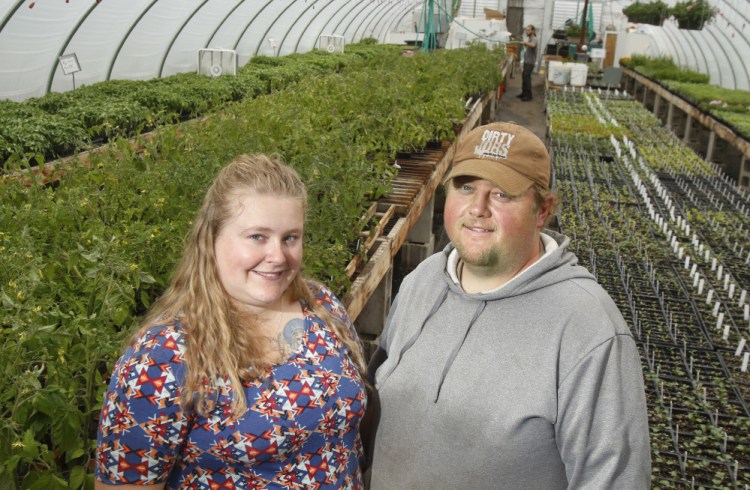Jonathan Tibbetts is in the process of taking over the family farm in Lyman. He’s doing that while juggling the duties associated with a diverse family farm, from making compost in bulk to planting sweet corn. We called him up to talk horse manure, food waste from schools and the trick his father played on Jonathan and his siblings to get them interested in farming.
PLANTING THE SEED: Tibbetts’ father, John, and mother, Elaine, purchased the farm in 1985. At that point John was working full time at Prime Tanning in Berwick, but he’d been a dairy farmer before and wanted to get his kids interested in working the land. He set up a self-serve vegetable stand and told his two sons and his daughter to fill it up with vegetables. The earnings would go to them.
“It was a way for us to pay for football cleats and summer camps,” Jonathan Tibbetts remembers. “It was a way for him to give us a little bit more responsibility.”
GO BIG OR GO HOME: The kids met the challenge. Their thumbs were green enough so that soon they were selling their own plants from the stand. “It got to the point where we either needed to go full time or scale it back,” Tibbetts said.
Their father took his severance package and used it to buy the kind of equipment they needed to jump-start the operation. That included starting to haul manure from horse farmers in the region (they pick up from 30 other farms now and use the manure as the base for a rich compost they call Barnyard Blend). Tibbetts enjoyed the work but said he never thought that one day he’d be buying the place.
“I don’t know if I actually had that much vision then,” he said. “It wasn’t like, ‘Oh eventually I’ll own all this.’ ”
WHY NOW? The transfer isn’t final yet – “we’re just kind of waiting on the banks” – but Tibbetts’ father has already started his transition. “He wants to kind of relax a little.” Not to golf or drape himself over a couch, though. The elder Tibbetts sucessfully ran for selectman in Lyman and does the work around the farm he loves best, like tending to the animals (they have beef cattle and pigs) and growing the sweet corn.
“He wants to be done with the day-to-day of chasing the money and making decisions.” (Us too.)
HORSE FEATHERS: Spring compost season has been in full swing since April, which means the family has been making deliveries of Barnyard Blend around the area. They also sell through their own greenhouse and wholesale to landscapers.
They’re constantly cooking the next batch of compost – fall is the other big season for compost sales – and turning the piles.
The Barnyard Blend recipe owes a lot to horses, but also to schoolchildren; Tibbetts picks up food waste from schools in Kennebunk, Sanford and sometimes at Bonny Eagle, all of which collect the discarded food in 55-gallon totes.
Elementary and middle school food waste is the best. How so? “Because they are better at sorting the food. At that age you can tell them what you want them to do and they’ll do it. They are not stubborn yet.”
SAY WHAT? Wait, children not stubborn? Tibbetts credits the good sorting habits to the teachers, who make the whole thing an educational venture. “The children are really interested in it,” he said. “They see the food waste that they are throwing away, and they end up getting back some compost, and they can say, ‘This came from our school.’ ”
Another benefit to incorporating school waste? The temperatures during the school year. “We don’t have the problems with the flies or with the smell. And those are the months that we are usually a little slower, so it works pretty well for someone to take a day and go pick it up.”
DIVERSIFY, DIVERSIFY: The work is all seasonal. In the winter, the Tibbettses operate snowplows. In the spring, they move on to compost, then vegetables in the summer. They hay as well. A growing herd of about 25 head of beef cattle rounds out the operation. Diversification keeps them financially stable. “If we have a bad compost year, we can make it up with a good snowplow year.” And what is a bad compost year? The kind where the seeds don’t cook out or a wet spring prevents the compost from drying out.
NICE NICHE: What’s the Tibbetts family’s niche? Probably sweet corn, in yellow and white varieties. “Most of the other growers around here only grow bicolor. We wanted to do something a little different.” In the beginning, they handed out samples to customers who came to the stand looking for bicolor corn. “We converted a lot of people.”
FARMER’S FAVORITE: Sweet corn is not the younger Tibbetts’ favorite crop, however. “Corn is very stressful. It is very easy to have it all ready at once, but it is very hard to have it ready every day. We plant almost every five to eight days in the spring and summer.” He likes watching tomatoes grow, but they’re not easy either. “Pumpkins are probably my favorite, because I like picking them.”
ELECTING OUT: His father’s retirement – how’s that going, especially with the responsibilities of being a selectman? It was a means to detach. “It gives him something to have his attention on, other than whether or not I talked to the lawyer or banks today,” Tibbetts said with a laugh. He gets that. And also why his father would still want to grow sweet corn or tend to the animals. It’s the business end of farming that makes farming hard. “If I could just sit on my tractor, I would be happy all day.”
Send questions/comments to the editors.



